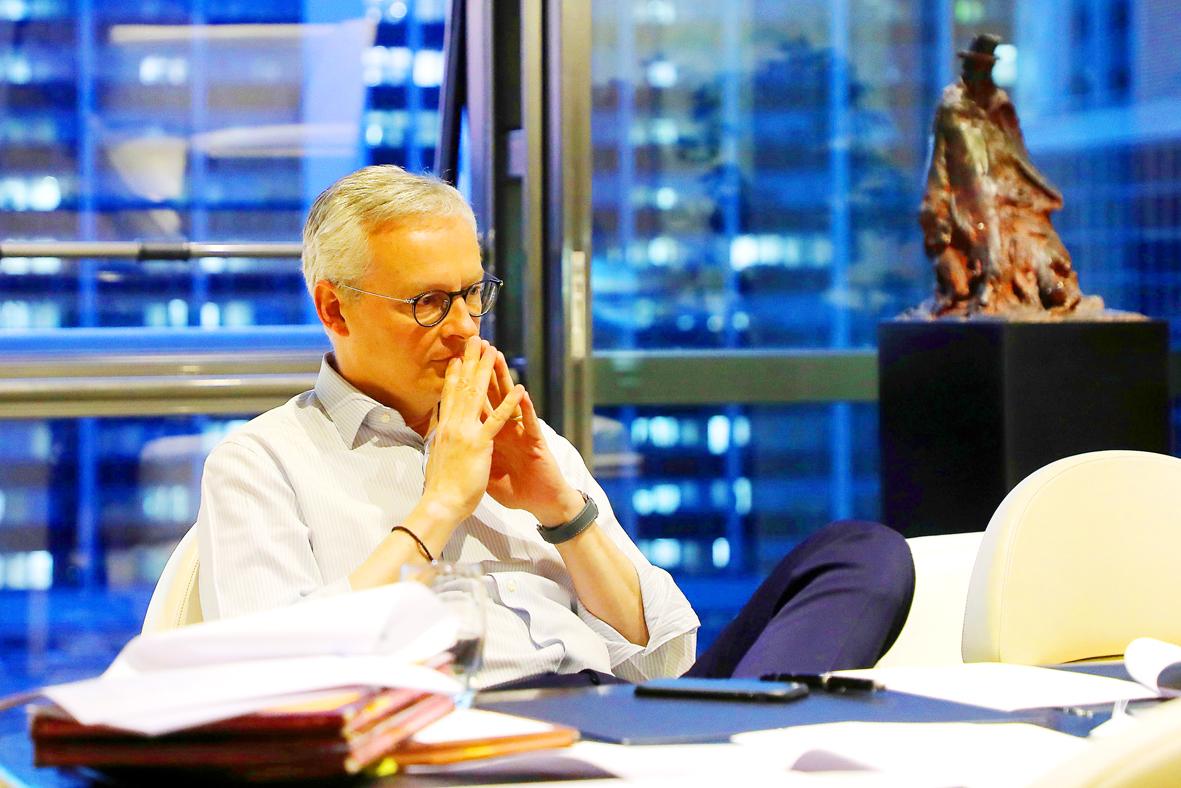EU finance ministers on Thursday agreed on a 540 billion euros (US$591 billion) package of measures to combat the economic fallout of the global COVID-19 pandemic. It is now up to EU leaders to approve the accord, which would require overcoming profound political disagreements.
In an emergency teleconference, the Eurogroup approved a plan to stave off what is expected to be a recession of unprecedented size.
The deal would lay to rest — at least temporarily — concerns that the EU was incapable of uniting behind a common strategy when it was most urgently needed.

Photo: AFP
In a sign of relief, ministers broke out in applause once a consensus was struck.
“Today, we agreed on three safety nets, and a plan for the recovery to ensure we grow together and not apart once the crisis is behind us,” said Portuguese Minister of Finance Mario Centeno, who heads the Eurogroup.
The common response includes a joint 100 billion euros employment insurance fund, a European Investment Bank instrument intended to supply 200 billion euros of liquidity to companies, as well as credit lines of as much as 240 billion euros from the European Stability Mechanism — the eurozone’s bailout fund — to backstop states as they go on a spending spree to help get economies back on their feet.
The ministers also agreed to work on a temporary fund that would help kick-start the recovery and support the hardest-hit nations, while not defining how it would be financed.
French Minister of the Economy and Finance Bruno Le Maire said the fund could be decided on in the next six months and could total 500 billion euros.
All of it needs approval by EU government leaders as early as next week, and tensions persist.
With several key divisions papered over, disagreements are likely to resurface when leaders are called to sign off.
The COVID-19 pandemic has overwhelmed Europe, with the continent suffering more than 65 percent of the worldwide deaths attributable to the coronavirus.
The scale of the damage shines a spotlight on the vulnerabilities of a union whose sense of common purpose has been tested over the past decade by the Greek debt crisis, an influx of refugees and Brexit, but the pandemic — in the words of German Chancellor Angela Merkel, a veteran of many geopolitical fights — poses the biggest threat to the EU since World War II.
Europe’s more-frugal north is pitted against Italy and Spain, the worst-affected nations, in a climate of mistrust and simmering resentment.
Disagreements were laid bare earlier this week when finance ministers failed to agree on a joint response after 16 hours of bitter negotiations.
Things were different on Thursday.
The meeting was delayed by nearly five hours while key nations — including the Netherlands, Italy, France, Germany and Spain — negotiated a compromise that would ultimately be uncomfortable to most, yet acceptable to all.
Once the meeting started, it took just 30 minutes to declare success.

Sweeping policy changes under US Secretary of Health and Human Services Robert F. Kennedy Jr are having a chilling effect on vaccine makers as anti-vaccine rhetoric has turned into concrete changes in inoculation schedules and recommendations, investors and executives said. The administration of US President Donald Trump has in the past year upended vaccine recommendations, with the country last month ending its longstanding guidance that all children receive inoculations against flu, hepatitis A and other diseases. The unprecedented changes have led to diminished vaccine usage, hurt the investment case for some biotechs, and created a drag that would likely dent revenues and

Global semiconductor stocks advanced yesterday, as comments by Nvidia Corp chief executive officer Jensen Huang (黃仁勳) at Davos, Switzerland, helped reinforce investor enthusiasm for artificial intelligence (AI). Samsung Electronics Co gained as much as 5 percent to an all-time high, helping drive South Korea’s benchmark KOSPI above 5,000 for the first time. That came after the Philadelphia Semiconductor Index rose more than 3 percent to a fresh record on Wednesday, with a boost from Nvidia. The gains came amid broad risk-on trade after US President Donald Trump withdrew his threat of tariffs on some European nations over backing for Greenland. Huang further

CULPRITS: Factors that affected the slip included falling global crude oil prices, wait-and-see consumer attitudes due to US tariffs and a different Lunar New Year holiday schedule Taiwan’s retail sales ended a nine-year growth streak last year, slipping 0.2 percent from a year earlier as uncertainty over US tariff policies affected demand for durable goods, data released on Friday by the Ministry of Economic Affairs showed. Last year’s retail sales totaled NT$4.84 trillion (US$153.27 billion), down about NT$9.5 billion, or 0.2 percent, from 2024. Despite the decline, the figure was still the second-highest annual sales total on record. Ministry statistics department deputy head Chen Yu-fang (陳玉芳) said sales of cars, motorcycles and related products, which accounted for 17.4 percent of total retail rales last year, fell NT$68.1 billion, or

Macronix International Co (旺宏), the world’s biggest NOR flash memory supplier, yesterday said it would spend NT$22 billion (US$699.1 million) on capacity expansion this year to increase its production of mid-to-low-density memory chips as the world’s major memorychip suppliers are phasing out the market. The company said its planned capital expenditures are about 11 times higher than the NT$1.8 billion it spent on new facilities and equipment last year. A majority of this year’s outlay would be allocated to step up capacity of multi-level cell (MLC) NAND flash memory chips, which are used in embedded multimedia cards (eMMC), a managed